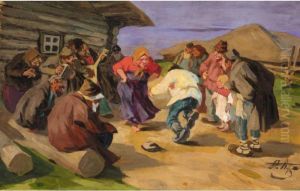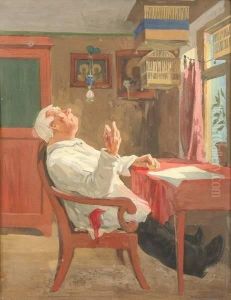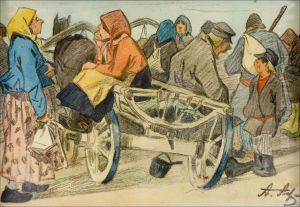Alekseij Fedorovitch Afanasev Paintings
Alekseij Fedorovitch Afanasev was not an artist in the traditional sense of painters or sculptors, but rather a significant figure in the realm of Russian folklore and literature. Born on July 11, 1826, in the Russian Empire, Afanasev became one of the first to systematically collect and study Russian folktales, making a considerable contribution to the cultural and literary history of Russia.
Afanasev's work was profoundly influenced by the burgeoning interest in folk cultures that swept across Europe in the 19th century, a period that saw many scholars collecting and cataloging folklore in their respective countries. In this intellectual climate, Afanasev began his extensive collection of Russian folk tales, a task that paralleled the Brothers Grimm's work in Germany.
His most famous work, 'Russian Fairy Tales,' was published in multiple volumes between 1855 and 1863 and remains a seminal collection in the study of folklore. The collection includes a wide range of folk tales, from magical fairy tales to household tales and legends. Afanasev's meticulous approach to collecting, recording, and categorizing these stories was groundbreaking. He sought to preserve the oral traditions of Russia's diverse regions, capturing the rich tapestry of cultural narratives that had been passed down through generations.
Afanasev was also interested in the origins and meanings behind the folk tales, delving into the mythological and cultural significance of the stories and their characters. He analyzed the tales within the broader context of Slavic mythology and folklore, contributing to the academic study of folklore as a field.
Despite his important work, Afanasev's life was not without challenges. His involvement in the intellectual and liberal movements of his time, as well as his critical attitude towards the autocracy and the Orthodox Church, led to surveillance and censorship by the Tsarist regime. These pressures, combined with financial difficulties, marked his later years.
Alekseij Fedorovitch Afanasev passed away on October 5, 1871, leaving behind a legacy that would inspire generations of folklorists, writers, and scholars. His pioneering work laid the foundations for the scientific study of folklore in Russia and helped to preserve the rich folk traditions of his homeland for posterity. Afanasev's collections continue to be celebrated for their contribution to the understanding of Russian culture, history, and literature.




